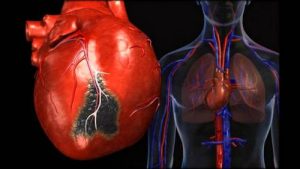Do COVID-19 vaccines cause myocarditis in young people? That is the question that concerns many adolescents and their families. The data seem to indicate that although there is a risk of getting myocarditis, which is an inflammation of the heart, the risk is exceedingly small. Moreover, the risk of myocarditis is much higher from contracting COVID-19 than from getting the vaccine.
Dr. Brian Feingold, an expert on heart inflammation in children at UPMC Children’s Hospital of Pittsburgh, put it plainly: “If you look at an isolated risk, you could really get yourself very worked up and scared,” adding, “Statistically, that’s way more likely” to get myocarditis from COVID-19. In fact, according to data from the TriNetX Research Network, which aggregates electronic health records from 48 mostly large U.S. Healthcare Organizations (HCOs), “Young males infected with the virus are up 6 times more likely to develop myocarditis as those who have received the vaccine.”
Moreover, the cases of myocarditis are associated with only mRNA vaccines, such as Moderna and Pfizer. Still, there is enough concern that FDA regulators are reviewing the safety data of Moderna for those under ages 12-17. Earlier in the year, regulators were concerned about reports in the United States linking the Moderna vaccine with cases of myocarditis, most notably in young males. After an initial review of the data, the decision was made to approve Moderna. However, “several Nordic countries said new information on the myocarditis rate in Moderna recipients was raising concerns, prompting the FDA to take another look,” according to the Washington Post.

Source: osvilt.com
When making decisions about whether a vaccine is safe for certain populations, regulators have to complete a thorough risk-benefit analysis to ensure their decision has the greatest overall positive impact for those populations. Dr. Ofer Levy, a voting member of the FDA’s vaccine advisory panel and director of the Precision Vaccines Program at Boston Children’s Hospital, frames it this way: “As we go into younger and younger age groups, they’re less and less at personal risk of severe Covid, and on the other hand, somewhat more at risk of this inflammatory heart condition with the mRNA vaccine. So it’s a risk-benefit analysis, and that’s why you’re seeing that deliberation.”
For their part, Moderna claims that more than 1.5 million adolescents have received its coronavirus vaccine worldwide and that its global safety database does not suggest an increased risk of myocarditis in that age group. Oddly, the young males most at-risk are not those with underlying medical issues, but those with no known health problems. As The Guardian reports, “analysis of medical data suggests that boys aged 12 to 15, with no underlying medical conditions, are four to six times more likely to be diagnosed with vaccine-related myocarditis than ending up in hospital with Covid over a four-month period.”
The latest study, released in early October, which reviewed reports filed between January 1, 2021, and June 18, 2021, among adolescents ages 12-17 who received mRNA vaccination against COVID-19, show 162.2 cases per million for males ages 12-15 and 94 cases per million for ages 16-17. The incidence rate among females was lower, with 13.0 cases per million among ages 12-15 and 13.4 per million among ages 16-17. The study also showed that most of the complications were seen after the second dose.
Most concerning, the researchers found that the myocarditis incidence rate “exceeds their expected 120-day COVID-19 hospitalization rate at both moderate (August 21, 2021 rates) and high COVID-19 hospitalization incidence,” meaning for a small subset, the risk of hospitalization from myocarditis induced by the mRNA COVID-19 vaccine is higher than the risk of hospitalization from COVID-19 itself.
This information will help regulars and doctors decide how to go about safely giving COVID-19 vaccinations to younger people. “While myocarditis after vaccination is exceptionally rare, we may be able to change the first or second doses or combine vaccines differently to avoid the risk at all, once we understand the physiology better,” said Saul Faust, professor of pediatric immunology and infectious diseases at the University of Southampton, who was not involved in the work.
It is worth noting that myocarditis has not been linked to the Johnson & Johnson COVID-19 vaccine. However, there are reports that the J&J vaccine may be linked to Guillain-Barré syndrome (GBS), a rare neurological disorder in which the immune system attacks the nerves and may require hospitalization. Yale Medicine states, “Of the 100 reports, 95 were serious and required hospitalization, and there was one reported death. Most of the cases were in men, and many of those men were ages 50 or older.”
To date, there has not been a causal link established between the J&J vaccine and GBS. And, much like the MRNA COVID-19 vaccinations, the incidences are very rare. Albert Shaw, MD, PhD, a Yale Medicine infectious diseases specialist, argues,“It should not prevent people from receiving the vaccine, as the benefits of the vaccine in preventing serious illness or death from COVID-19 greatly outweigh the risks.”
At Newsweed.com, we adhere to three simple principles: truth, balance, and relatability. Our articles, podcasts, and videos strive to present content in an accurate, fair, yet compelling and timely manner. We avoid pushing personal or ideological agendas because our only agenda is creating quality content for our audience, whom we are here to serve. That is why our motto is ”Rolling with the times, straining for the truth.”
Your opinion matters. Please share your thoughts in our survey so that Newsweed can better serve you.






